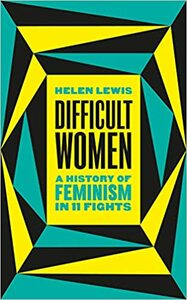Take a photo of a barcode or cover
Firstly, the layout is a great time and just makes it enjoyable and accessible to read. I think the pacing of the book was quite well done with good sign posting as you continue throughout the chapters. Although each chapter is obviously a different fight, the main theme (that I got anyways) of imperfection and the value of compromise remained strong throughout culminating to a great ending of needing more organisation and less focus on women's individual choices.
I think this book just really resonated with me and took me back to the roots of feminism and collective fights rather than personal choices women make, which does seem to be the current mainstream in feminism (perhaps because that's a nice easy distraction to avoid any real needed conversations.) Even the chapters you might think you know loads about, you end up learning a lot so a great time.
It was well written, she has a strong voice and quite funny at times. It nice to see someone not shy away from difficult people or difficult conversations that are not popular or palatable.
Yeah overall v happy with this, thx @ will for reading this or I would never have heard of it. Love goodreads, just brings me endless joy.
Thanks to NetGalley for providing me a complimentary copy of Difficult Women: A History of Feminism in 11 Fights by Helen Lewis in exchange for my honest review.
Well-behaved women don't make history: difficult women do. Helen Lewis argues that feminism's success is down to complicated, contradictory, imperfect women, who fought each other as well as fighting for equal rights. Too many of these pioneers have been whitewashed or forgotten in our modern search for feel-good, inspirational heroines. It's time to reclaim the history of feminism as a history of difficult women. In this book, you'll meet the working-class suffragettes who advocated bombings and arson; the princess who discovered why so many women were having bad sex; the pioneer of the refuge movement who became a men's rights activist; the 'striker in a sari' who terrified Margaret Thatcher; the wronged Victorian wife who definitely wasn't sleeping with the prime minister; and the lesbian politician who outraged the country. Taking the story up to the present with the twenty-first-century campaign for abortion services, Helen Lewis reveals the unvarnished - and unfinished - history of women's rights. Drawing on archival research and interviews, Difficult Women is a funny, fearless and sometimes shocking narrative history, which shows why the feminist movement has succeeded - and what it should do next. The battle is difficult, and we must be difficult too.
This is the first feminism book I have read, so I wasn’t quite sure what to expect. I have always been interested in this topic and wanted to educate myself more but I never knew where to start. This was such an interesting book and I have learnt so much from it.
One of my favourite things about this book, is how it was split up into eleven different parts e.g. ‘Sex’ and ‘Abortion’ and how they influence equality between the sexes. I found each section very well researched and it included information that you wouldn’t necessarily find in other feminism books.
Just as the title suggests, women are often seen as difficult. This can be due to many different reasons, but throughout this book we learn that we are not difficult, we actually speak the truth, becoming more confident within ourselves and so much more. I have always hated it when men say we are difficult and this book made me feel less alone with the feeling.
As I mentioned earlier, this was my first feminism book I have read. If you are like me and what to start to educate yourself about feminism then this is a great start. If you are more knowledgeable about the topic, I’m sure you will be able to learn something new.
You can buy 'Difficult Women' here
What I loved is, there's mostly no airbrushing, no one is put on a pedestal — the good and the bad parts are narrated equally.
Which you'll realise eventually, is precisely why the word 'Difficult' has been used.
Really enjoyed it. I though it was well structured, the information was delivered in a very direct tone, learnt a lot from it and was really pleasant to read, I arrived at the end abruptly (mainly because it said I was only 70% through on kindle - gotta blame that pesky inclusion of bibliography without clarification on the progressometer!) and thought 'oh, is that it?' - a rare occurence in non-fiction world. Also, highlighted some good book reccs embedded in the text?? - thanks Helen! Deffo had a lot of 'LISTEN TO THIS' moments directed at whomever I was nearest at the time.
A q it threw up for me was: how important is consistency of thought in feminism and really in general? A lot of the women did things that furthered the dismantling of patriacal structures which is obviously useful and shouldn't be erased but were somewhat all over the place in the consistency of their ideologies- or maybe this is somewhat explained by examining retrospectively??
I also liked the reaffirmation of these historical victories into modern feminist discourse which can cast off earlier waves (excuse the p u n) as archaic. I think given the likley readership (probably people in their 20-30's) it could contribute to a narrowing of the generation rifts within feminism and the understanding that every generation will have it's landmark battles but these ultimately have been enabled by those that stood before.
Great book.



